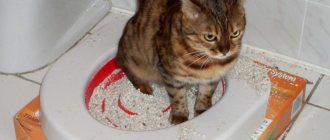Preparing for the appearance of a cat in the house begins with the purchase of things necessary for it:
- Food It
is important to choose food that is familiar to the cat, that is, it should be the brand that the previous owners fed it. If you purchase a purebred kitten, breeders may offer a small amount of food as a gift. Don't forget to check the serving size and feeding time for your pet; - Tray with filler
It is also advisable to clarify what kind of filler the previous owners used. However, be prepared for the fact that the cat may refuse it in a new place. Be patient while searching for the best option; - House or bed
To reduce the stress of being in a new place, ask the breeder for a bedding or rug from the cat’s previous habitat. Place it inside the lounger or hutch; - Scratching post
Its purchase is especially important for adult animals. By the way, if you wish, you can make this accessory yourself; - Toys
It is better to have a lot of them and they are different. Read in advance about how to choose the right toys so that they do not harm your pet.
Traveling to a new home with minimal stress
To ensure that the trip brings as little stress as possible to the kitten, it is advisable to familiarize it with the carrier in advance. Ask the breeder to supply your carrier a few days before you plan to pick up your baby. Let the kitten explore the carrier and get used to it.
Choose the shortest route to your home so that the journey does not take much time. Do not let the kitten out of the carrier; he should not walk around the car while it is moving. Many carriers have a special window so you can stick your hand through. Use this opportunity to calm your baby.
Dangers at every turn
A kitten is the same child, small and unintelligent. Every day he explores new territory, not even suspecting how many dangers may await him. What should the owner do to protect the baby?
Remove all flower pots
It doesn’t matter whether they are on the windowsill or somewhere else. The kitten may not knock them over, but he can try the leaves “to the teeth”
And some indoor plants can be poisonous.
Raise and secure the curtains. Curtains and especially heavy drapes are a favorite pastime for cats, regardless of age. They love to climb on them. In the best case, the cats will simply tear off the curtain, in the worst case, they will fall down along with the curtain rod. In the worst case scenario, your claw will get stuck in the curtain fabric and your finger will be broken or dislocated.
Close windows and vents. It's good if the apartment is on the first floor. Even after chasing a flying bird, butterfly or fly, the baby will simply jump onto the lawn under the window. The main thing is that he does not hide in fear in the basement, where it will be difficult to find him. It's another matter when the apartment is on the top floors of a high-rise building. A special peak of “catfall” occurs in the warm season, when windows and balconies are open. Therefore, it is worth taking care of a special durable mesh in advance.
Remove all litter from the cat's sight. No matter how well-fed the pet is, animal instincts always kick in. And everything that smells good should be eaten or at least tasted. The result is overturned trash cans, dirt and intestinal obstructions. Even a small piece of plastic from fish or meat can cause trouble. And then you can’t do without the help of a specialist.
Hide the wires. Kittens love to chew on them, which is fraught with tragedy.
However, even the most caring owners cannot always foresee everything. Therefore, if there is the slightest problem with the kitten’s health, they should consult a veterinarian for advice.
At first, limit the space to one room.
For the first few days, keep your baby in one of the rooms. It should contain bowls and a tray. If the tray is far away, the kitten may not reach it or may even forget where the toilet is. There should also be toys and a scratching post in the room.
Place the carrier in the room and let the kitten decide when to go out. Let him get used to the new smells. Some kittens are more curious than others and will come out of hiding faster. Don't rush your pet. When the kitten comes out and gets used to it a little, show him where the tray is and where the bowls are.
Dangers at every turn
A kitten is the same child, small and unintelligent.
Every day he explores new territory, not even suspecting how many dangers may await him. What should the owner do to protect the baby? Remove all flower pots
It doesn’t matter whether they are on the windowsill or somewhere else. The kitten may not knock them over, but it can taste the leaves “to the teeth.” And some houseplants can be poisonous
And some indoor plants can be poisonous.
Raise and secure the curtains. Curtains and especially heavy drapes are a favorite pastime for cats, regardless of age. They love to climb on them. In the best case, the cats will simply tear off the curtain, in the worst case, they will fall down along with the curtain rod. In the worst case scenario, your claw will get stuck in the curtain fabric and your finger will be broken or dislocated.
Close windows and vents. It's good if the apartment is on the first floor. Even after chasing a flying bird, butterfly or fly, the baby will simply jump onto the lawn under the window. The main thing is that he does not hide in fear in the basement, where it will be difficult to find him. It's another matter when the apartment is on the top floors of a high-rise building. A special peak of “catfall” occurs in the warm season, when windows and balconies are open. Therefore, it is worth taking care of a special durable mesh in advance.
Remove all litter from the cat's sight. No matter how well-fed the pet is, animal instincts always kick in. And everything that smells good should be eaten or at least tasted. The result is overturned trash cans, dirt and intestinal obstructions. Even a small piece of plastic from fish or meat can cause trouble. And then you can’t do without the help of a specialist.
Hide the wires. Kittens love to chew on them, which is fraught with tragedy.
However, even the most caring owners cannot always foresee everything. Therefore, if there is the slightest problem with the kitten’s health, they should consult a veterinarian for advice.
Avoid noise and guests
Try to ensure that no guests come to you in the first days and that the house is not too noisy. The kitten is getting used to its new home; additional smells and sounds can cause stress. Because of this, the adaptation process will be delayed. If there are children in the house, try to explain that you need to be quieter to allow the pet to get used to the new home.
If the kitten hides at first, this is normal. Give him time to get comfortable
Signs of approaching labor
Signs of impending labor in cats can appear either the day before birth or one to two hours before it. It depends on the characteristics of each cat’s body. In cats giving birth for the first time, symptoms begin earlier because the animal’s body takes more time to adjust.
Signs of imminent labor are as follows:
The animal loses its appetite, it drinks a lot - this is how the body prepares for lambing; Manifestation of lethargy - the cat spends almost all of its time in the place that it has chosen for birth; The active movement of the abdomen is noticeable, since the kittens move energetically before the onset of contractions, taking the most convenient position for passing the birth canal. If there are many kittens or they are large, then such a movement can begin two days before birth; The cat actively licks the genital slit, because... vaginal discharge appears
She maintains cleanliness as this is important to prevent infection; The removal of a plug that covered the uterus during pregnancy. If the plug comes out, labor will begin within one to two hours; Rectal temperature drops to 37 degrees (this prevents bleeding after childbirth and during the process); The appearance of colostrum - when you press on the nipples, a white drop appears; The cat hunches over, screams and tries to hide - this behavior is possible 4-6 hours before the onset of labor due to the appearance of false contractions
They prepare the appearance of kittens, but do not open the uterus. False contractions help determine the appearance of real contractions.
Let the kitten explore space
When the kitten gets comfortable in the room and gets used to you, you can begin to introduce it to the rest of the space. Start with another room and let your pet explore it. When he gets used to the new room, the space can be expanded: let the kitten into the kitchen or bathroom.
How quickly a kitten gets used to each new room depends on its temperament. Some kittens adapt quite quickly, others will take longer. If your kitten is a timid one, don't rush him. Use treats to reward your pet.
Road
A proper move for an animal must begin with proper transportation.
Airplane
If you have a flight ahead, you can take the cat into the cabin or transfer it to the luggage compartment as special cargo. The choice of transportation in this case depends on the weight of the pet. According to airline rules, no more than 5 animals can be in the cabin, so when purchasing a ticket, be sure to indicate that you are flying with a tailed “passenger.”
For transportation in the cabin, the weight of the animal must not exceed 8 kg; a carrying bag with a hard bottom or a special container is also required. You must also be prepared to present the following documents: veterinary passport, microchipping certificate and F1 veterinary certificate. For transportation in the cargo compartment, you also need a container with an information plate (breed, nickname, age, vaccination information, name and phone number of the owner). You can arrange such a sign at the reception desk.
Train
When purchasing a train ticket, please note that sleeping animals are not allowed in luxury carriages. Also, access of purring passengers is prohibited in some types of compartments
The requirements for having a veterinary passport and other certificates are constantly changing, but we still advise you to take all the necessary documents with you.
It will not be superfluous to have the animal microchipped - the chip will help to find the animal if it accidentally jumps out at a bus stop, as well as preventive measures against worms (after all, on the road the animal is exposed to many risks). Don't forget to take with you a carrier, diapers, harness, favorite food and necessary medications.
If there is already a cat in the house
If you already have a cat, then you need to introduce the new tenant to the older friend gradually. Here's the best way to do it.
Let the cats recognize each other's scent
When you bring the kitten home, take something with its scent and put it where the older cat lives. And in the kitten’s room, put something that smells like an older cat. This is how animals recognize each other's smell.
Continue introducing cats in absentia
If the cats do not show signs of aggression by sniffing each other's things, continue to introduce them through smells. Lock the older cat in the room and let the kitten explore new territory. He will not only get used to the new home, but also to the smell of his older comrade. After this, return the kitten to its room and release the older cat. He will feel the smell of the baby and will gradually get used to it.
Arrange a meeting for the cats
When both pets get used to each other's smell, arrange a meeting for them. Place the kitten in the carrier and close it. Place the carrier outside the room where the kitten lives. Let the pets look at each other and sniff each other through the door of the carrier.
If the animals show aggression, continue to familiarize them with each other's scent for a few more days. After that, try again to arrange a safe meeting for them.
Let the cats get to know each other
If the animals are not aggressive, leave the door to the kitten's room ajar. This will give the baby the opportunity to go out and explore the territory, and the older cat the opportunity to visit the kitten. Keep an eye on how pets get to know each other. Be prepared to break them up if they get into a fight.
Observe the pets' relationships. Sometimes cats may hiss at each other; this is normal behavior. Cats respect a hierarchy, and it may take time for it to become established between your pets.
It can take a lot of effort for pets to become friends. Be patient and everything will work out.
Be patient and your pets will soon become friends
It may take time to accustom a kitten to a new home. It all depends on your pet. The main thing is to let the kitten know that he is safe and that he is loved, then he will feel comfortable faster.
Author of the article
Vadim Larionov
Founder of SUPERPET
Rate this article
- 5
- 4
- 3
- 2
- 1
0
votes, average:
0 out of 5
Preparation
For each individual animal, adaptation to another place of residence can occur in different ways. In any case, if the cat is already an adult and was suddenly transported to someone else’s house with new owners, it will experience stress, which will negatively affect its physical condition. Therefore, if an adult cat moves into a new home, everything must be done to ensure that the animal experiences a minimum of discomfort. First, the owner is recommended to create conditions for the pet that are as close as possible to those where he lived before. To do this, it is better to ask the old owners about what house the cat lived in, what she liked to play with, what to eat, etc. Afterwards, recreate a similar environment in your home, giving the animal a secluded corner where it could retire and calm down.
If the cat is hiding and does not come out of the shelter for a long time, you need to place a bowl of food and water nearby. To calm your pet, it is recommended to talk to it calmly and affectionately. While the cat is adapting, there are times when he doesn’t eat or drink for several days. There is no need to worry about this. As soon as the animal understands that the owner is friendly towards him, he will stop being afraid.
Things you can prepare before moving
Feed
If you adopt an animal from a nursery, be sure to ask the breeder about the brand of food so that you can feed the cat the usual food for the first time.
In addition to the brand of food, find out the meal times and portion sizes.
Tray and filler
In addition to the brand of food, it is important to find out the type of filler. This is important because the pet is accustomed to a certain type and may not accept a new one due to a different consistency or smell.
On a note!
Even with new litter, the cat may not go into the litter box. The reason may be either in the tray itself (wrong depth, shape, location) or in the stress of moving. Be patient and understanding.
Bed\house
For the first time, the cat must have a corner where she can retire and feel safe.
To make her as comfortable as possible, ask her previous place of residence for a handkerchief or cloth, rug/bedding. Placing him in a house or bed in a new place will help your pet reduce stress and feel comfortable.
scratching post
You won't need it if you're taking a kitten. But for adults it is mandatory if you don’t want problems with wallpaper and furniture.
Toys
It’s good when they are different and in large quantities.
In a special store or from a breeder, ask what safe and educational toys you can buy for your breed.
How to catch a wild cat?
Catching a feral cat is not an easy task. As soon as a person approaches her, she will probably try to run away. Therefore, to catch it, you will need a trap, inside of which bait is laid out - treats. You can even make it from an ordinary carrier. Special devices are designed so that the door slams shut when the cat steps on a special platform. A soft bedding or terry towel is placed inside.
Another method of catching a cat takes longer. The animal is fed every day at a certain time until trust in the person arises.
You can catch a cat using simple designs
If there are no infectious diseases, then upon returning home the animal is bathed, given anti-worm medication, and after a few days treated for fleas.
In the next 14 days, they are quarantined, which will help avoid infecting other animals. Another goal is the adaptation of the new resident. To do this, choose an isolated room to which other pets have no access.
Dangers at every turn
A kitten is the same child, small and unintelligent. Every day he explores new territory, not even suspecting how many dangers may await him. What should the owner do to protect the baby?
Remove all flower pots
It doesn’t matter whether they are on the windowsill or somewhere else. The kitten may not knock them over, but he can try the leaves “to the teeth”
And some indoor plants can be poisonous.
Raise and secure the curtains. Curtains and especially heavy drapes are a favorite pastime for cats, regardless of age. They love to climb on them. In the best case, the cats will simply tear off the curtain, in the worst case, they will fall down along with the curtain rod. In the worst case scenario, your claw will get stuck in the curtain fabric and your finger will be broken or dislocated.
Close windows and vents. It's good if the apartment is on the first floor. Even after chasing a flying bird, butterfly or fly, the baby will simply jump onto the lawn under the window. The main thing is that he does not hide in fear in the basement, where it will be difficult to find him. It's another matter when the apartment is on the top floors of a high-rise building. A special peak of “catfall” occurs in the warm season, when windows and balconies are open. Therefore, it is worth taking care of a special durable mesh in advance.
Remove all litter from the cat's sight. No matter how well-fed the pet is, animal instincts always kick in. And everything that smells good should be eaten or at least tasted. The result is overturned trash cans, dirt and intestinal obstructions. Even a small piece of plastic from fish or meat can cause trouble. And then you can’t do without the help of a specialist.
Hide the wires. Kittens love to chew on them, which is fraught with tragedy.
However, even the most caring owners cannot always foresee everything. Therefore, if there is the slightest problem with the kitten’s health, they should consult a veterinarian for advice.











